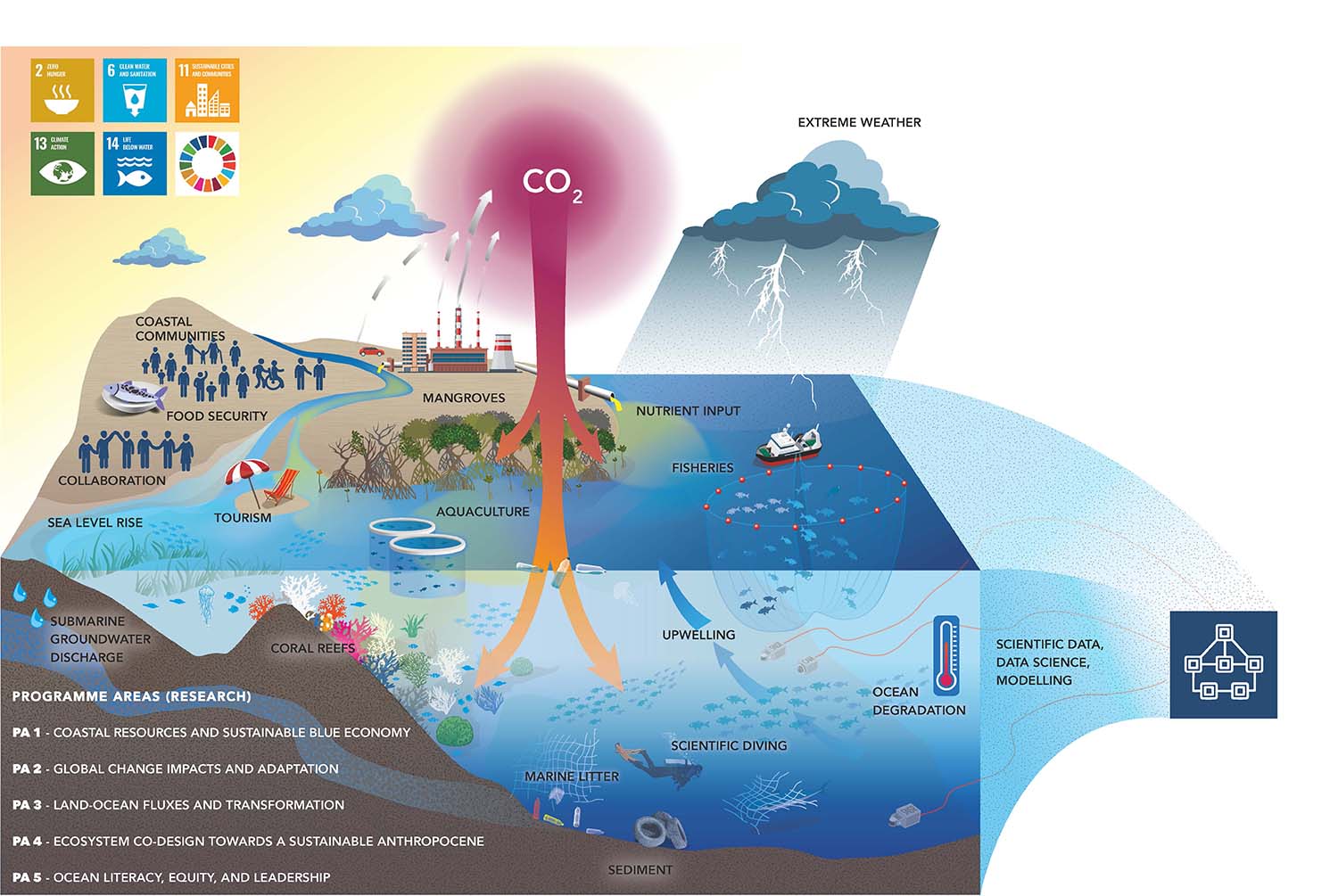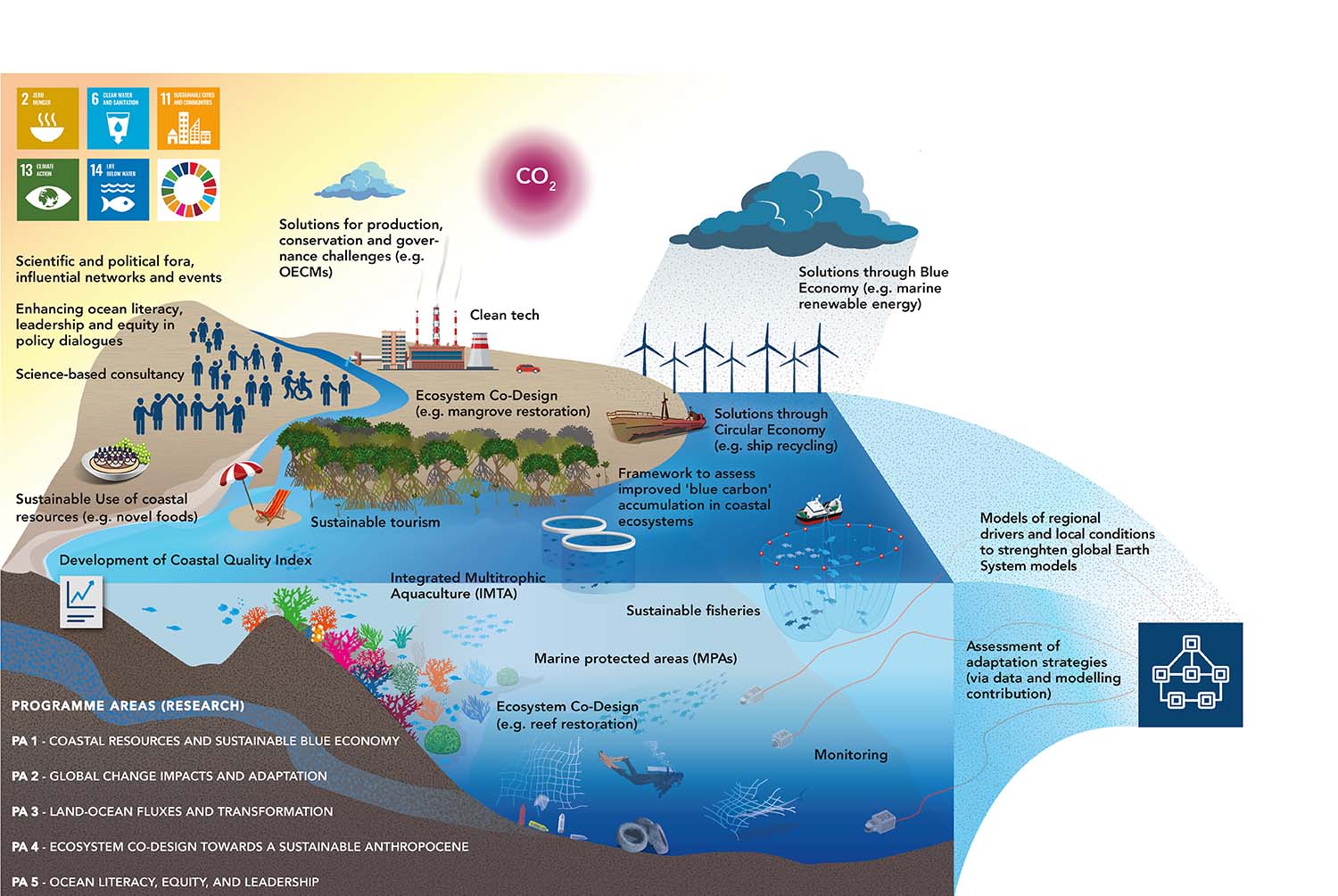
Illustration: Hans-Werner Eberhardt | Plan 2
Our complex world faces major ecological, social, political and economic challenges. Unsustainable economic development results in climate change, loss of biodiversity and environmental degradation and is flanked by social inequality, poverty, migration, and hunger. These effects are particularly severe in regions with rapid development and high population growth. Coastal tropical ecosystems and their livelihoods are a hotspot of those changes:
- Coastal waters are deteriorating due to pollution and eutrophication – reducing contamination through agricultural run-off, pesticides, plastics and untreated sewage is necessary.
- Marine litter and plastic pollution of the oceans and the coastal regions are becoming an ever-increasing problem. According to a recent OECD report, there are now an estimated 30 million tonnes of plastic waste in seas and oceans, and a further 109 million tonnes have accumulated in rivers.
- On a global scale, carbon emissions from human activities are causing ocean warming, acidification and oxygen loss with severe consequences for mangroves, coral reefs and fish populations. Reef-building corals create habitats for around one third of all named marine species (excluding microbes and fungi), but less than 30 percent of the global coral reefs are in a good condition; tipping points for coral reefs might be transgressed even if global warming can be limited to 1.5ºC.
Against this bleak backdrop the work of the Leibniz Centre for Tropical Marine Research (ZMT) in Bremen is more important than ever.
Tropical coastal ecosystems such as mangroves, coral reefs or seagrass meadows count among the most productive and diverse habitats of our planet. They are an essential source of food and income for billions of people and central to the economy and tourism sectors in many tropical countries. Countries of the tropics are home to almost half of the world’s population; they have a strong voice in international political, economic relations and provide relevant choke points for shipping routes.
ZMT is an internationally renowned centre of excellence and the only scientific institute in Germany that investigates these tropical and subtropical coastal ecosystems and their services for nature and people. Through its activities in interdisciplinary research, training and consulting, ZMT contributes to the protection and sustainable use of tropical coastal ecosystems and their role in mitigating climate change. With a unique strength in social science, ZMT assesses livelihoods of tropical coastal zone communities and strengthens capacity development.

Illustration: Hans-Werner Eberhardt | Plan 2
Solution-oriented research to meet current and future challenges of the Anthropocene
The climate and planetary emergency call for an emphasis on solutions, societal impacts and transformations in cooperation with local stakeholders. ZMT’s strength lies in engaging in regional and local research studies and measuring campaigns during field work complemented by data analysis to generate models for local and regional scenarios. Upscaling solutions by using data analytics, digital tools and modelling at different scales has become a necessary complement to analytical work on the ground.
The goal is to limit the global temperature increase to a maximum of 1.5 °C - the scientifically underpinned target set by the IPCC in 2018 and increasingly accepted politically since the Paris Agreement of 2015. To achieve this, the inclusion of the oceans is crucial. They serve as a sink for 25-30% of global greenhouse gas emissions and are thus an essential buffer for global warming. Tropical coastal ecosystems play an important role in this context.
Tapping the potential of the Blue Economy
By studying and evaluating collective action, market developments and policies in areas such as tourism, aquaculture, fishery, blue urban development, ZMT research plays a significant role in developing solutions through the Blue Economy, which is estimated to be the 8th largest economy worldwide and expected to shape future patterns for prosperity. ZMT undertakes a range of case studies typically at the interface of qualitative and quantitative research. It does so by also reflecting on the sustainability dimension of a Blue Economy and co-developing recommendations and options for coastal communities. In a perspective, ZMT intends to shape the Blue Economy discourse and combine it with strategies on net zero carbon (e.g. marine renewable energy) and a circular economy (e.g. ship recycling).
Systems Thinking and Integrated Modelling
21st Century challenges require system thinking and modelling on regional and global scales with view to weather extremes, marine heatwaves as well as global-change-induced impacts on coasts and their communities, on coral reefs, mangroves, marine food and ecosystem services in general. Such models support the prediction and development of capabilities and adaptation efforts in long-term settings.
With digital tools and dynamic approaches, ZMT is developing and running a data lab, and a whole suite of models. A special emphasis is on addressing processes across spatial and temporal scales with relevance for tropical coastal communities. It is of utmost importance to complement global models on earth systems with low-scale dynamic models able to offer more specific insights in regional drivers and local conditions.
Blue Carbon as a means to mitigate climate change
Ecosystems such as mangroves, seagrass, marshes or moorlands offer a unique service: as carbon sinks they remove large amounts of carbon dioxide from the atmosphere and store it long-term. This so-called "blue carbon" helps mitigate climate change and is seen as seen as a promising nature-based solution for adaptation to climate change impacts. It can play a role in net zero strategies and also offer co-benefits for coastal communities, if essential ecosystem services are sufficiently understood. Hence, strategies and investments in 'blue carbon' need to be accompanied by scientific monitoring and valuations of ecosystems services including essential geo-biochemical flows of nutrients and sediments. In collaboration with local actors, scientists at ZMT can provide assessments on the ground, collect data, engage in capacity development, and offer strategic know-how as well as modelling expertise.
Nature-based solutions, conservation, and novel ecosystem co-design
Management, conservation, restoration and better stewardship of marine resources and ecosystems such as reefs and mangroves are core topical areas of ZMT’s work and drive its engagement in recommendations for policy development as well as consulting services. Such work is becoming even more significant in view of the Post-2020 Global Biodiversity Framework (GBF), which aims to halter biodiversity loss by protecting at least 30% of sea areas. In addition, Other Environmental Conservation Measures (OECMs) are increasingly recognized as tool towards sustainable use and co-benefits for coastal communities. In a perspective, ZMT addresses the research need for reefs, mangroves and other ecosystems to be restored through novel design, innovations, and local collaborations.
Inter- and transdisciplinary research to foster ocean literacy, cooperation and capacity development
ZMT is dedicated to developing new ideas and fresh research in an inter- and transdisciplinary exchange. Its thriving PhD programme and alumni network is a continuous wellspring of creative insights. Adding its long-standing core competence in capacity development and partnerships in equivalence, it is able to excel in research-based transformation and co-creation, using exchange programmes, digital tools, and skill training in its Academy. Focussing on ocean literacy, inclusive leadership and the exchange with stakeholders from business, politics and the NGO sectors, ZMT is developing multi-level partnerships and novel pathways in the UN Ocean Decade.
Please see also About Us.




